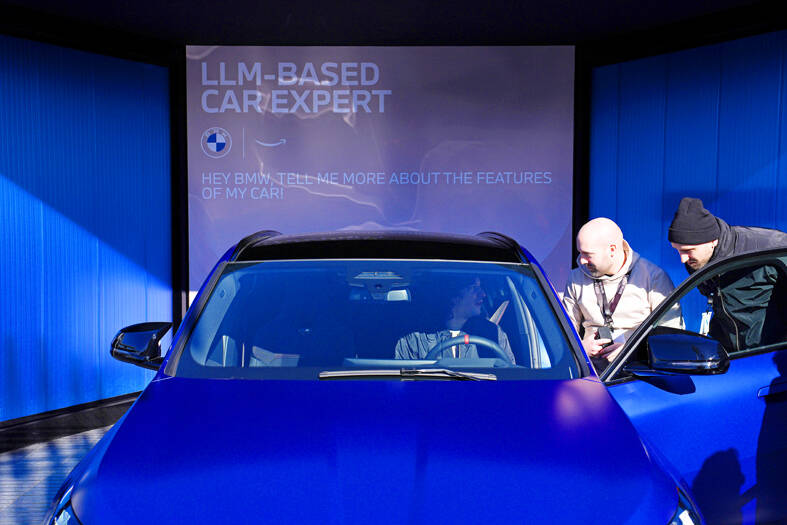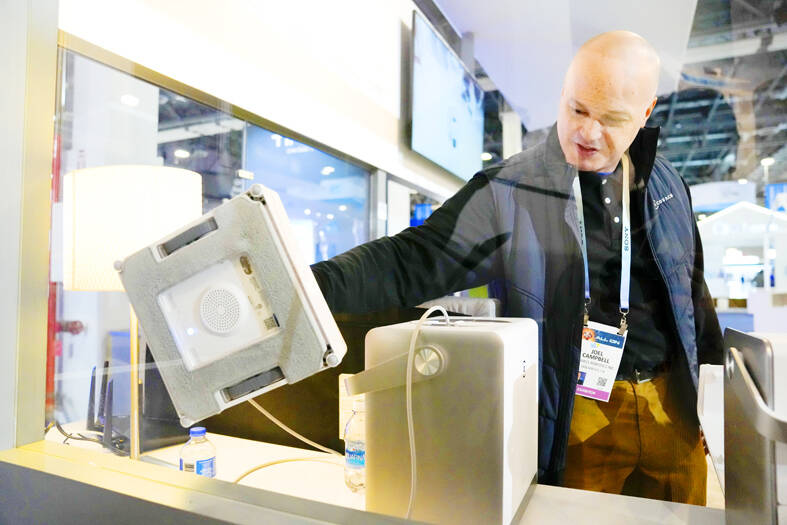The best CES products pierce through the haze of marketing hype at the Las Vegas gadget show to reveal innovations that could improve lives.
However, the worst could harm us or our society and the planet in such “innovatively bad” ways that a panel of self-described dystopia experts has judged them “Worst in Show.” The third annual contest that no tech company wants to win announced its decisions on Thursday.
“From easily hackable lawn mowers to US$300 earbuds that will fail in two years, these are products that jeopardize our safety, encourage wasteful overconsumption, and normalize privacy violations,” the group of consumer and privacy advocates judging the awards said.

Photo: EPA-EFE
The contest has no affiliation with CES or the trade group that runs the expo.
They made the choices based on how uniquely bad a product is, what impact it could have if widely adopted and if it was significantly worse than previous versions of similar technology. The judges represent groups including Consumer Reports, the Electronic Frontier Foundation and right-to-repair advocates iFixit.
EARBUD DUDS

Photo: AP
German audio electronics-maker Sennheiser showcased the fourth generation of its Momentum True Wireless ear headphones, which are usually known to last for a while.
However, iFixit CEO Kyle Wiens says the latest US$300 earbuds are a “betrayal of the brand” because they are too disposable, with three separate batteries that will likely fail after a few years and cannot easily be replaced.
“Start by selling batteries and releasing repair instructions,” he wrote. “Then work on making the battery easier to swap.”

Photo: AP
Sennheiser did not immediately respond to a request for comment.
DANGEROUS CARTECH
Automotive technology is annually a big focus at CES. And two brickbats were awarded to carmaker BMW, one of those involving a partnership with Amazon’s voice assistant Alexa.
Powered by a large language model — the type of AI system behind chatbots like ChatGPT — Amazon says an Alexa “car expert” will be able to provide “quick instructions and answers about vehicle functions in a much more human, conversation-like manner, and even act on your behalf.”
Being able to ask Alexa to unlock the front door or turn off the porch light sounds convenient, but what if it is being voiced by a violent ex?
“We have seen an increasing number of horrific stories where people, generally women, who are trying to escape abusive domestic situations end up having their cars serve as tracking and abuse vectors,” said a “Worst in Show” judge’s comment from Electronic Frontier Foundation executive director Cindy Cohn.
She added: “Alexa and BMW — and frankly all of the car companies who are racing to turn our cars into tracking devices — need to ensure that victims can turn this off.”
BMW Group spokesperson Jay Hanson said the company designed and delivered the voice assistant with privacy in mind and customers have the choice of whether they want to use it.
“BMW and Amazon share a strong commitment to maintaining customers’ trust and protecting their privacy, including giving them control over their data,” he said in an e-mail on Thursday.
BMW is also showcasing augmented-reality glasses designed by Xreal that are supposed to overlay helpful information and virtual objects that you see ahead of you as you drive. Another judge called it a “recipe for distracted driving” that could also pave the way for a future of vision-obscuring ads.
Hanson said the augmented reality experience demonstrated at CES was a showcase of “potential use cases” that could aid or entertain people, but that minimizing driver distraction remains a key principle in what BMW rolls out to customers.
ROBOT VACUUMS
AND ‘MACROWAVES’
The cybersecurity “Worst in Show” went to China-based robot vacuum-maker Ecovacs. Robotic vacuums are nothing new, but Paul Roberts of Secure Repairs says the new X2 Combo combines all the elements for intrusive home surveillance — cameras, microphones, LiDAR, voice recognition and computer vision that can recognize objects — without any guarantee that its unencrypted images or video feed cannot be hacked.
The environmental impact “Worst in Show” went to one of many Internet-connected food tech appliances showcased at CES 2024. Revolution Cooking’s US$1,800 “macrowave” combines a microwave with a convection oven, but such trendy gadgets are typically short-lived and encourage people to trash the simpler appliances they already have, according to Shanika Whitehurst of Consumer Reports.
“Adding electronics to perfectly functional appliances dramatically increases their environmental impact, requiring vast amounts of resources and energy,” she wrote.
Revolution Cooking and Ecovacs did not immediately respond to requests for comment.
WHO ASKED FOR MORE GROCERY ADS?
Nathan Proctor, the national campaign director for US PIRG, a consumer advocacy group, selected as his “Worst in Show” the new video ads on Instacart’s “AI-powered” shopping cart.
General Mills, Del Monte Foods and Dreyer’s Grand Ice Cream are among the companies that are to advertise on the carts during an upcoming pilot at West Coast stores owned by Good Food Holdings.
Equipped with cameras and sensors, the cart has a screen that shares real-time recommendations based on what customers put in the cart, like advertising ice cream if a customer buys cones.
“It uses historic shopping behavior to push junk foods you’ve bought before,” Proctor wrote. “Grocery stores are overwhelming and navigating promotions is exhausting, and I question the sanity of whoever thought we should make it worse.”
Instacart did not immediately respond to a request for comment.

With an approval rating of just two percent, Peruvian President Dina Boluarte might be the world’s most unpopular leader, according to pollsters. Protests greeted her rise to power 29 months ago, and have marked her entire term — joined by assorted scandals, investigations, controversies and a surge in gang violence. The 63-year-old is the target of a dozen probes, including for her alleged failure to declare gifts of luxury jewels and watches, a scandal inevitably dubbed “Rolexgate.” She is also under the microscope for a two-week undeclared absence for nose surgery — which she insists was medical, not cosmetic — and is

CAUTIOUS RECOVERY: While the manufacturing sector returned to growth amid the US-China trade truce, firms remain wary as uncertainty clouds the outlook, the CIER said The local manufacturing sector returned to expansion last month, as the official purchasing managers’ index (PMI) rose 2.1 points to 51.0, driven by a temporary easing in US-China trade tensions, the Chung-Hua Institution for Economic Research (CIER, 中華經濟研究院) said yesterday. The PMI gauges the health of the manufacturing industry, with readings above 50 indicating expansion and those below 50 signaling contraction. “Firms are not as pessimistic as they were in April, but they remain far from optimistic,” CIER president Lien Hsien-ming (連賢明) said at a news conference. The full impact of US tariff decisions is unlikely to become clear until later this month

GROWING CONCERN: Some senior Trump administration officials opposed the UAE expansion over fears that another TSMC project could jeopardize its US investment Taiwan Semiconductor Manufacturing Co (TSMC, 台積電) is evaluating building an advanced production facility in the United Arab Emirates (UAE) and has discussed the possibility with officials in US President Donald Trump’s administration, people familiar with the matter said, in a potentially major bet on the Middle East that would only come to fruition with Washington’s approval. The company has had multiple meetings in the past few months with US Special Envoy to the Middle East Steve Witkoff and officials from MGX, an influential investment vehicle overseen by the UAE president’s brother, the people said. The conversations are a continuation of talks that

CHIP DUTIES: TSMC said it voiced its concerns to Washington about tariffs, telling the US commerce department that it wants ‘fair treatment’ to protect its competitiveness Taiwan Semiconductor Manufacturing Co (TSMC, 台積電) yesterday reiterated robust business prospects for this year as strong artificial intelligence (AI) chip demand from Nvidia Corp and other customers would absorb the impacts of US tariffs. “The impact of tariffs would be indirect, as the custom tax is the importers’ responsibility, not the exporters,” TSMC chairman and chief executive officer C.C. Wei (魏哲家) said at the chipmaker’s annual shareholders’ meeting in Hsinchu City. TSMC’s business could be affected if people become reluctant to buy electronics due to inflated prices, Wei said. In addition, the chipmaker has voiced its concern to the US Department of Commerce